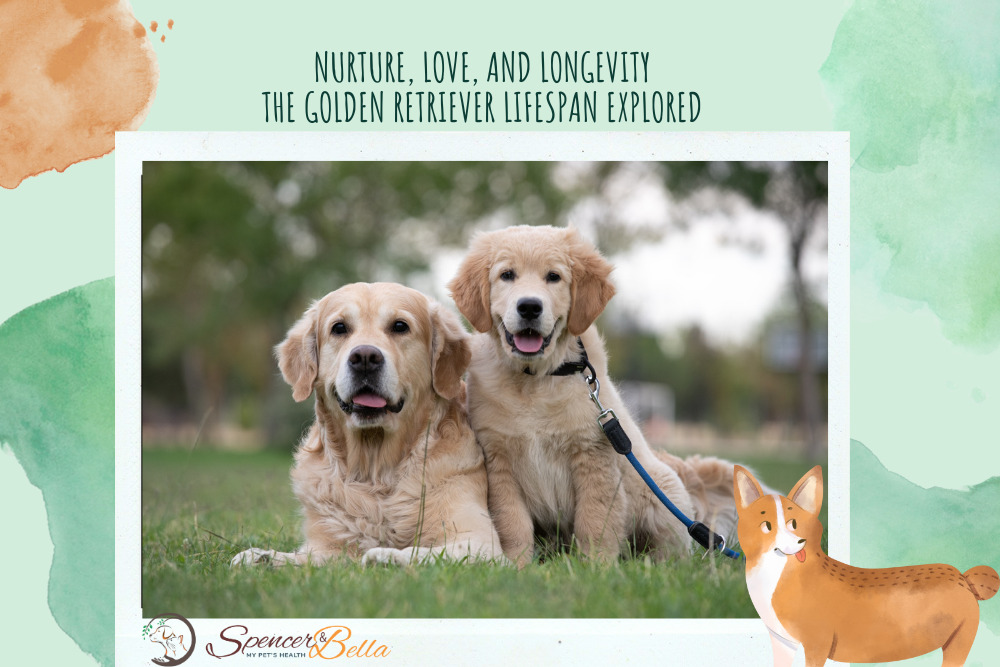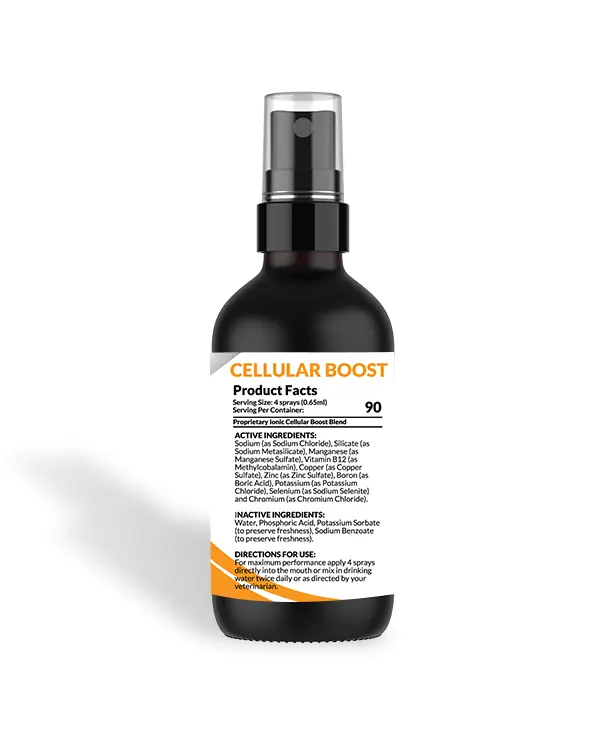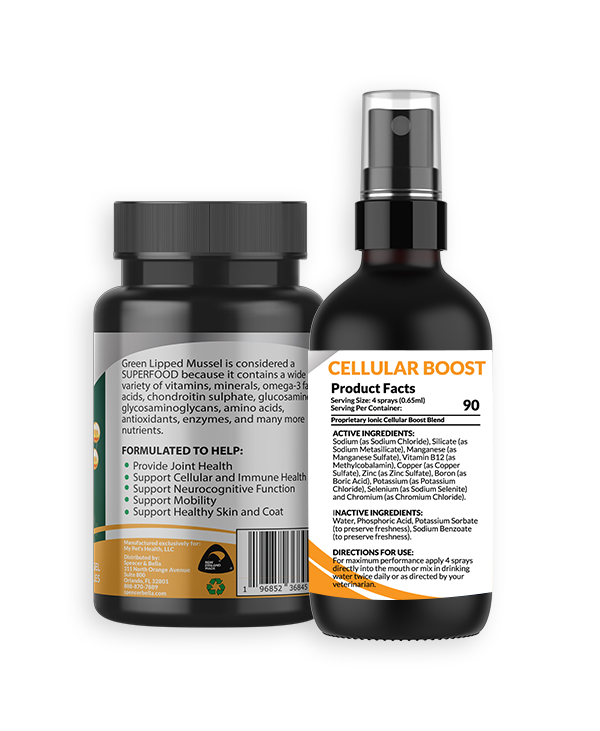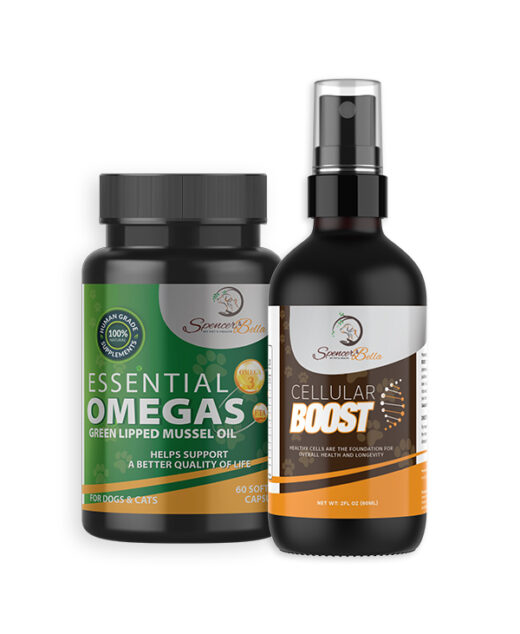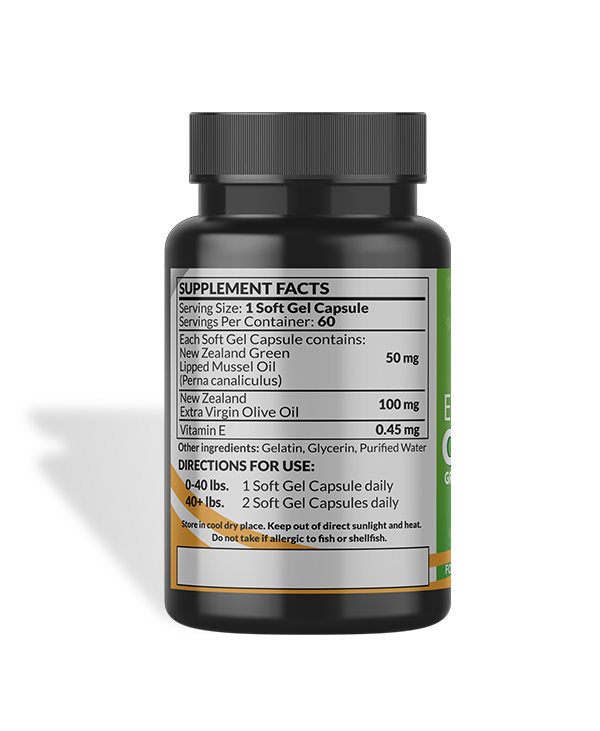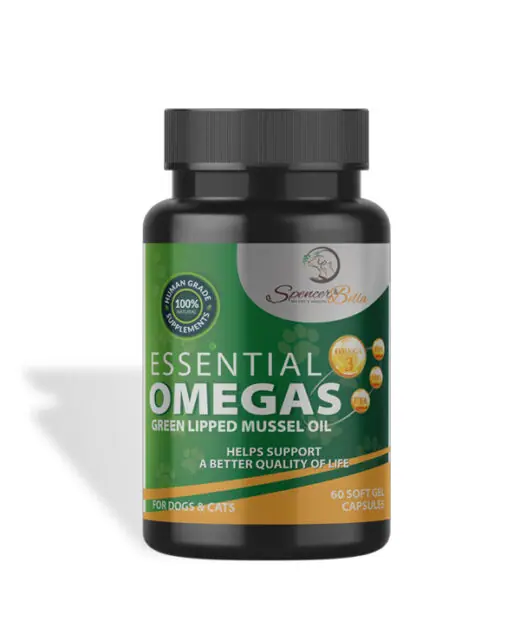I have had the joy of adopting and caring for six Golden Retrievers over the past two decades. Each time I welcomed one of these loving companions into my family, my utmost wish was for them to have a long and fulfilling life. This deep-rooted passion for the well-being of my Golden Retrievers led me to launch My Pet’s Health. Through my experiences, I have discovered two remarkable formulas, Cellular BOOST and Essential OMEGAS, that have played a vital role in enhancing the health and longevity of my Goldens. Now, I am eager to share the knowledge of Golden Retriever Lifespan with fellow Retriever owners and enthusiasts.
When you bring a Golden Retriever into your life, you are not merely adopting a pet; you are embracing a loyal companion and welcoming a cherished member into your family. As responsible pet owners, it is our duty to prioritize their health and happiness. Understanding the life span of your beloved Golden Retriever is fundamental for providing them with the best possible care.
In this comprehensive article, we will delve into the Golden Retriever longevity. We will explore their average life expectancy, the factors that influence Golden Retriever Lifespan, and the role of supplements like Cellular BOOST and Essential OMEGAS in promoting a healthier and longer life for these beloved canines.
Golden Retriever Life Expectancy: Deciphering Their Average Lifespan
Embarking on the exploration of the golden retriever lifespan sheds light on a fascinating narrative that encompasses not only golden retriever life expectancy but also retriever lifespan variations. Beyond the conventional 10 to 12-year range lies a captivating tale influenced by factors such as breeding practices, healthcare innovations, and a growing understanding of their unique needs. This comprehensive journey, reflective of both the golden retriever’s average lifespan and the nuanced aspects of the average life of a golden retriever, offers a holistic perspective on the lives of these cherished companions. It’s a narrative that embraces the distinctions between male and female golden retriever lifespan, enhancing our appreciation for the diverse pathways that shape their remarkable existence.
Historically, Golden Retrievers had a shorter life span, often ranging from around 8 to 10 years. This was influenced by factors like limited access to advanced veterinary care, less understanding of their dietary and exercise needs, and potential genetic issues that were not well addressed in breeding practices.
However, as veterinary medicine and knowledge about dog care evolved, there has been a positive impact on the life span of Golden Retrievers. With better access to medical treatments, improved nutrition, responsible breeding practices focusing on reducing inherited health issues, and heightened awareness of their specific requirements, many Golden Retrievers now live longer and healthier lives.
It’s important to note that individual life spans can still vary based on genetics, overall health, care, and environmental factors. Responsible breeding practices have contributed significantly to the increased life expectancy, as breeders aim to produce healthier puppies with fewer predisposed genetic health concerns.
Gender and Life Span: Unveiling the Differences
When exploring the life span of Golden Retrievers, gender is a factor that can influence their longevity. While the impact is not drastic, there are certain considerations to take into account when it comes to the life expectancy of both males and females, as well as the influence of altered versus non-altered dogs.
Gender Differences:
Male Golden Retrievers: On average, male Golden Retrievers tend to have a slightly shorter life span compared to their female counterparts. This difference is often attributed to various factors, including the potential for increased susceptibility to certain health issues. However, the gap in life span between males and females is generally not substantial and falls within a reasonable range.
Golden Retriever Lifespan Female: Female Golden Retrievers, on average, may enjoy a slightly longer life span than males. This can be partly attributed to the potential protective effects of hormonal factors, such as estrogen, which may have some positive influence on overall health and longevity.
Altered vs. Non-Altered:
Altered (Spayed/Neutered) Dogs: The decision to spay or neuter a Golden Retriever can also impact their life span. These dogs, both males and females, often experience a reduction in certain health risks. For instance, spayed females have a reduced risk of certain reproductive-related health issues, while neutered males may face a lower risk of testicular cancer. These alterations can contribute positively to their overall well-being and potentially extend their life span.
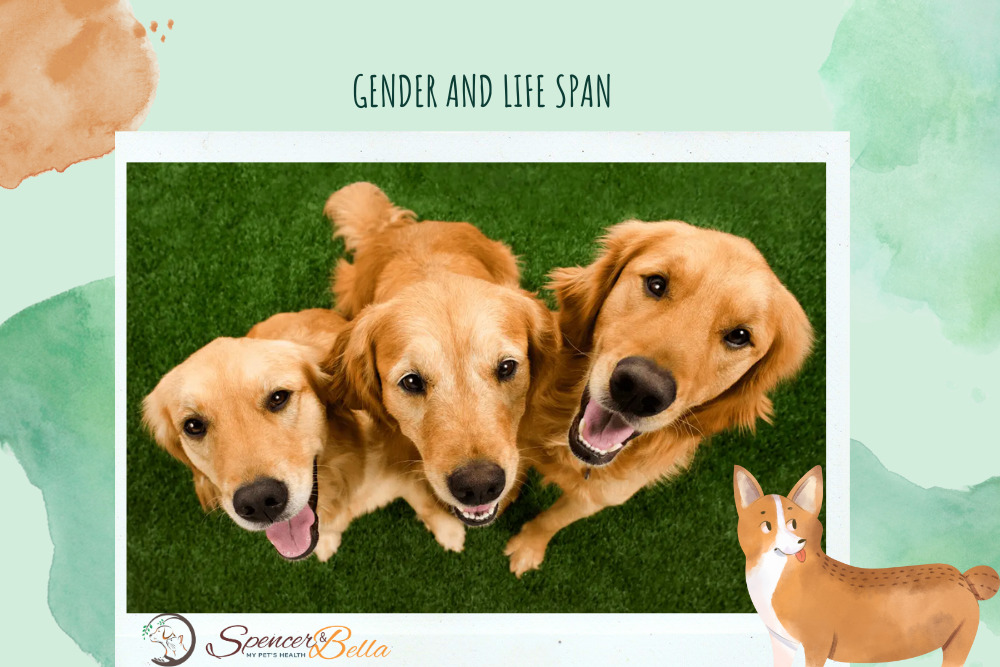
Non-Altered Dogs:
Golden Retrievers that are not spayed or neutered may have a slightly different life span due to the potential influence of reproductive-related health risks. Unaltered females, for example, may be susceptible to certain uterine infections and mammary tumors, which can impact their longevity. Similarly, unaltered males might be at a slightly higher risk for certain reproductive-related health concerns.
Individual Variations:
It’s important to note that individual variations play a significant role in life expectancy. Factors such as genetics, overall health, quality of care, exercise, diet, and access to veterinary attention all contribute to the differences in life span among Golden Retrievers. Responsible ownership, regular veterinary check-ups, and preventive care remain critical components in promoting a longer and healthier life for both male and female Golden Retrievers.
Factors Affecting Golden Retriever Lifespan
Genetics
Genetics unquestionably holds a critical position in shaping the life expectancy of Golden Retrievers. Responsible breeders understand the profound impact that genetics can have on the overall health and well-being of Golden Retrievers. By focusing on genetic considerations, breeders work diligently to enhance the potential life span of Golden Retrievers and mitigate the risk of inherited health problems.
Selective Breeding for Health:
Responsible breeders prioritize the health and genetic background of their breeding dogs as a fundamental aspect of their practices. They carefully select breeding pairs based on a comprehensive understanding of genetics, aiming to produce puppies with robust genetic profiles. This selective approach is aimed at reducing the likelihood of passing on hereditary health concerns to the next generation.
Identifying and Addressing Health Issues:
Breeders actively engage in health screening and testing protocols to identify potential genetic health issues in their breeding dogs. This thorough assessment helps to identify dogs with a clean bill of health and those that may carry genetic markers for certain conditions. By avoiding breeding pairs with known health issues, breeders can significantly decrease the risk of passing down these concerns to offspring.
Reducing Inherited Health Problems:
The diligent selection of breeding pairs with favorable genetic backgrounds contributes to the reduction of inherited health problems among Golden Retrievers. Conditions such as hip dysplasia, heart conditions, and certain types of cancer can have genetic components. By minimizing the presence of these genetic markers through strategic breeding, responsible breeders help promote the overall well-being and longevity of future generations.
Collaboration with Veterinary Professionals:
Responsible breeders often collaborate closely with veterinary professionals and canine geneticists to make informed breeding decisions. This collaboration ensures that the latest scientific knowledge and tools are applied to enhance the genetic health of the breed. Genetic testing and pedigree analysis aid in making well-informed choices to improve the health and longevity of Golden Retrievers.
Ethical Considerations:
Responsible breeders have a strong commitment to the breed’s health and welfare. Their dedication to ethical breeding practices extends beyond appearance and emphasizes the genetic soundness of their dogs. By promoting responsible breeding, they contribute to the preservation and betterment of the Golden Retriever breed.
Diet and Nutrition
Providing a balanced and nutritious diet is essential for supporting a Golden Retriever’s overall well-being. High-quality dog food that meets their nutritional needs is the cornerstone of their health. A diet rich in essential nutrients, vitamins, and minerals can contribute to their longevity and reduce the risk of health problems associated with poor nutrition.
Diet and Nutrition: RAW or KIBBLE – Which is Better for Golden Retrievers?
Providing a balanced and nutritious diet is of utmost importance when it comes to supporting a Golden Retriever’s overall well-being. The dietary choices we make for our furry companions play a significant role in their health, vitality, and longevity. Two popular options that often spark debates among pet owners are raw and kibble diets. Let’s explore the benefits and considerations of each to determine which may be better suited for Golden Retrievers.
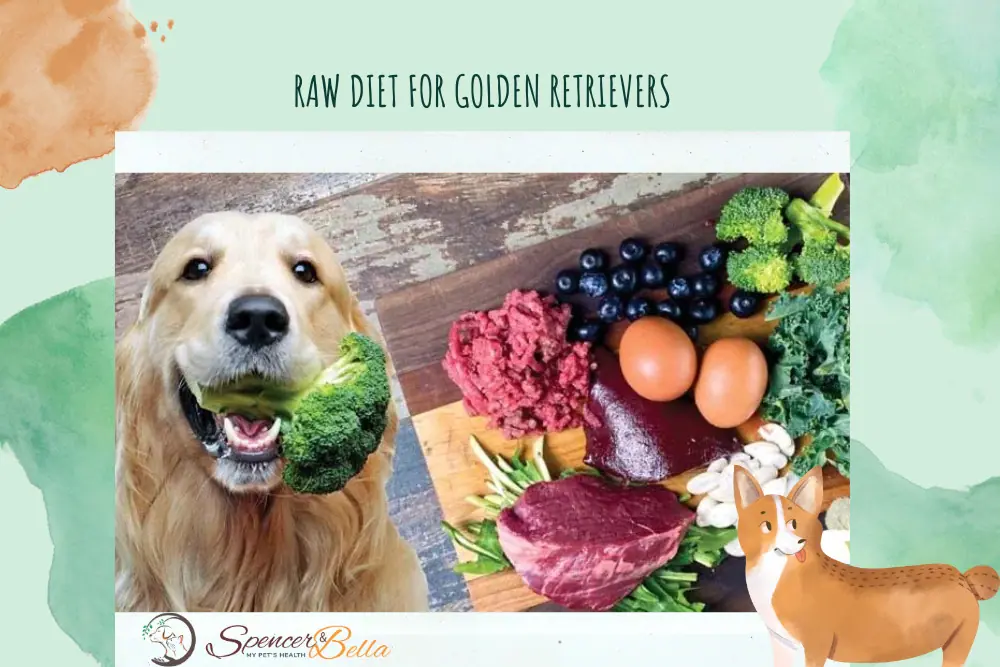
RAW Diet for Golden Retrievers
The raw diet, also known as the “BARF” diet (Biologically Appropriate Raw Food), involves feeding dogs uncooked, natural foods such as raw meat, bones, organs, and vegetables. Proponents of the raw diet claim several potential benefits:
- Nutrient Density: Raw food enthusiasts argue that feeding dogs raw, whole foods can provide them with a wide range of essential nutrients, vitamins, and minerals in their natural, unprocessed form.
- Digestive Health: Some believe that the raw diet is easier for dogs to digest, as it more closely resembles what their ancestors ate in the wild.
- Improved Coat and Skin: Advocates assert that a raw diet can lead to healthier skin and a shinier coat in dogs.
- Dental Health: Chewing on raw meaty bones can help maintain dental health by promoting natural teeth cleaning.
However, it’s essential to consider potential drawbacks of the raw diet:
- Potential Health Risks: Raw food carries a risk of bacterial contamination, such as salmonella or E. coli, which can pose health hazards to both dogs and their human caregivers.
- Nutritional Balance: Ensuring a raw diet provides all the necessary nutrients in the right proportions can be challenging, and nutritional imbalances can lead to health issues.
KIBBLE Diet for Golden Retrievers
Kibble, or dry dog food, is a processed and convenient option commonly available in stores. It typically contains a combination of meat, grains, vegetables, and added vitamins and minerals. Some benefits of the kibble diet include:
- Convenience: Kibble is easy to store, measure, and serve, making it a convenient option for many pet owners.
- Nutritional Consistency: Reputable commercial dog foods are formulated to provide a balanced and complete diet, ensuring dogs receive all the essential nutrients they need.
- Reduced Health Risks: Properly processed kibble is less prone to bacterial contamination compared to raw food.
On the other hand, potential concerns with the kibble diet include:
- Fillers and Additives: Some commercial kibbles may contain fillers and additives that offer little nutritional value.
- Processing Methods: The high-temperature processing involved in making kibble may degrade some nutrients.
Which diet is Better for Golden Retrievers?
Ultimately, the choice between a raw and kibble diet depends on various factors, including the dog’s individual health needs, lifestyle, and owner preferences. While the raw diet offers a natural and nutrient-rich approach, it requires careful sourcing, preparation, and handling to minimize health risks. On the other hand, high-quality commercial kibbles can provide balanced nutrition and convenience.
Consulting with a veterinarian or a canine nutritionist can help determine the best diet for your Golden Retriever based on their specific needs and health considerations. Whichever diet you choose, ensuring it meets their nutritional requirements and supports their overall well-being is key to a happy and healthy life for your furry companion.
Physical Factors Affecting Golden Retriever Lifespan
Regular Exercise
Golden Retrievers, renowned for their lively and enthusiastic demeanor, thrive on regular exercise that harmonizes their physical health with their mental well-being. The engagement in daily physical activities plays a pivotal role in extending their life span and enhancing their overall happiness.
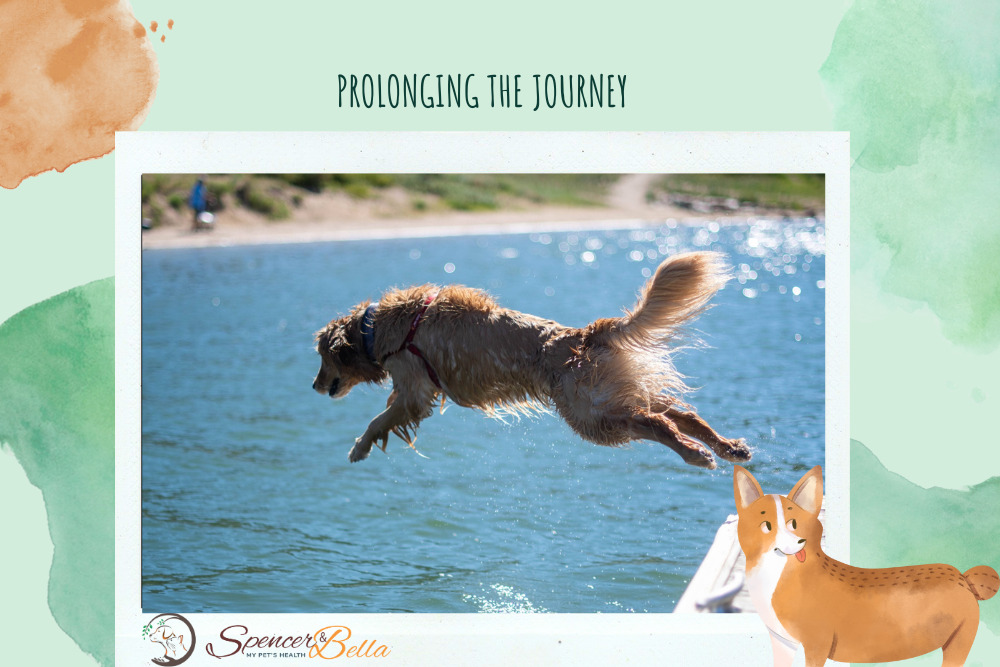
Energetic and Playful Nature:
Golden Retrievers are endowed with an inherent energy and playfulness that sets them apart. This vibrant spirit calls for an outlet, and regular exercise serves as the ideal channel to satiate their zest for life. Their love for movement and activity is palpable, reflecting their natural inclination to stay active.
Physical Health Enhancement:
Regular exercise acts as a cornerstone of Golden Retrievers’ physical well-being. Engaging in activities like daily walks, games of fetch, and playtime sessions bolsters their cardiovascular health, strengthens muscles, and maintains a healthy weight. These benefits contribute significantly to their longevity, ensuring that their bodies remain resilient and strong.
Mental Stimulation and Contentment:
Beyond the physical advantages, regular exercise also bestows remarkable mental stimulation upon these intelligent dogs. Engaging in activities like fetching not only stimulates their physical senses but also challenges their cognitive abilities. Mental engagement wards off boredom and restlessness, leading to a content and fulfilled life.
Bonding and Social Interaction:
Physical activities serve as opportune moments for bonding between Golden Retrievers and their human companions. Whether it’s a brisk walk in the park or a game of catch, these shared experiences foster a strong connection, deepening the bond between pet and owner. The companionship and mutual joy of these moments contribute to a healthier emotional state for both parties.
Stress Reduction and Behavior Management:
Regular exercise also plays a pivotal role in stress reduction and behavior management. Physical activity helps channel excess energy, preventing the development of undesirable behaviors borne out of boredom. A well-exercised Golden Retriever is often more relaxed and less prone to engaging in destructive behaviors.
Adapting Exercise to Individual Needs:
It’s important to tailor exercise routines to individual Golden Retrievers based on factors like age, health condition, and activity level. Moderation is key, as excessive exercise can strain joints or lead to fatigue. Consulting with a veterinarian can provide guidance on creating a suitable exercise regimen.
Love for the Water:
Notably, many Golden Retrievers have a natural affinity for water. Their love for swimming is a delightful addition to their exercise repertoire. Engaging them in aquatic activities not only provides excellent physical workout but also taps into their inherent joy of water play.
Healthcare and Vet Check-ups
Ensuring the well-being of your beloved Golden Retriever requires a proactive approach to healthcare and regular veterinary check-ups. These essential practices not only contribute to their longevity but also empower you with the tools to provide the best care possible.
Comprehensive Monitoring:
Regular veterinary check-ups stand as a cornerstone of Golden Retrievers’ health management. These scheduled visits offer a comprehensive assessment of your dog’s overall health, providing a baseline for tracking any changes over time. From physical examinations to diagnostic tests, these appointments form a critical link in their well-being journey.
Early Detection and Prevention:
One of the most significant advantages of routine veterinary check-ups is early detection. Golden Retrievers, while beloved for their qualities, can be susceptible to certain health conditions, including cancer. Timely visits to the vet can aid in the early identification of potential issues, allowing for prompt intervention and a higher likelihood of successful treatment.
Tailored Preventive Care:
Veterinarians are equipped to offer tailored preventive care strategies that suit your Golden Retriever’s specific needs. Vaccination schedules, parasite control, dental care, and nutrition recommendations are all facets of preventive care that contribute to their overall health and well-being.
Holistic Wellness Assessment:
Beyond physical health, veterinary check-ups provide a platform for a holistic wellness assessment. This includes evaluating behavioral patterns, addressing concerns about weight management, and discussing any changes in appetite or activity levels. These discussions contribute to a more comprehensive understanding of your dog’s health.
Cancer Awareness and Screening:
Given the susceptibility of Golden Retrievers to certain cancers, vigilance is crucial. During veterinary check-ups, your vet can guide you in performing monthly checks for any unusual lumps, bumps, or changes in your dog’s skin. Early detection of abnormalities can lead to swift medical attention and improved outcomes.
Educational Opportunities:
Veterinary check-ups offer a valuable educational opportunity for pet owners. Your veterinarian can provide insights into your Golden Retriever’s specific needs, dietary recommendations, exercise routines, and behavior management. This partnership between you and your vet ensures that your dog’s care is informed and aligned with their individual requirements.
Golden Retriever Lifespan Enhancement:
The proactive approach of regular veterinary check-ups contributes to the enhancement of your Golden Retriever’s life span. Catching potential health issues early allows for timely intervention, which can significantly impact their overall quality of life. Regular visits to the vet contribute to a happier, healthier journey for both you and your beloved companion.
Understanding Golden Retriever Aging
As our beloved Golden Retrievers journey through life, it is essential to understand the different stages of their aging process. Just like humans, Golden Retrievers go through distinct life stages, each with their unique characteristics and requirements. By comprehending the various phases of their aging journey, we can provide them with the care and attention they need to lead happy, healthy, and comfortable lives.
Early Life Stages
The early life stages of a Golden Retriever encompass puppyhood and adolescence. This period is characterized by rapid growth, learning, and exploration. Here are some key aspects to consider during this phase:
Puppyhood: From birth to around 6 months, puppies are in their adorable and curious puppyhood stage. They are highly energetic, playful, and require plenty of socialization and training. Proper socialization during this period lays the foundation for a well-adjusted and friendly adult dog.
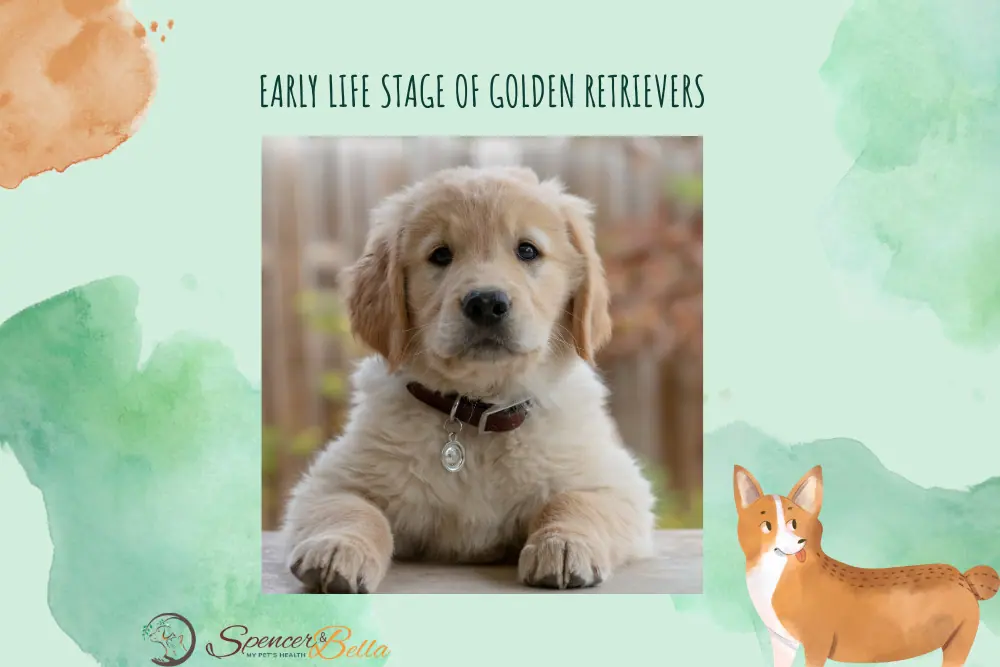
Adolescence: As puppies mature into adolescents, usually between 6 months to 2 years, they may display some rebellious behaviors. This phase is marked by increased independence and a desire to test boundaries. Patience, consistent training, and positive reinforcement are essential during this time to guide them into adulthood successfully.
Adulthood and Beyond
Adulthood in Golden Retrievers typically begins around the age of 2 and lasts until they reach around 7 years. This phase is often considered the prime of their lives, and they are at their physical and mental peak. Here are some important aspects to consider during adulthood:
Physical Health: Adult Golden Retrievers are generally active and energetic, enjoying regular exercise and playtime. Maintaining their physical health through a balanced diet, regular exercise, and routine veterinary check-ups is crucial during this stage.
Mental Stimulation: Mental stimulation is essential to keep adult Golden Retrievers engaged and content. Providing them with interactive toys, puzzles, and obedience training can help keep their minds sharp and prevent boredom.
Preventive Care: Regular visits to the veterinarian for preventive care, vaccinations, and dental check-ups are crucial during adulthood. Routine health examinations help detect any potential health issues early on, enabling prompt intervention and treatment.
Signs of Aging
As Golden Retrievers move into their senior years, typically around 7 years and older, they may start showing signs of aging. Just like humans, their bodies may become less resilient, and they may require special care and attention during this phase:
- Reduced Energy: Senior Golden Retrievers may exhibit lower energy levels and may not be as active as they once were. Adjusting their exercise routine to accommodate their energy levels is essential.
- Joint Health: Arthritis and joint stiffness may become more prevalent in senior dogs. Providing them with joint supplements or medication prescribed by a veterinarian can help alleviate discomfort and improve mobility.
- Dental Health: Dental health becomes even more critical in older dogs. Regular dental check-ups and teeth cleaning can prevent dental issues and keep their mouths healthy.
- Dietary Changes: As they age, their nutritional needs may change. Switching to a senior-specific diet that addresses their specific needs is advisable.
- Regular Check-ups: Senior Golden Retrievers may require more frequent visits to the veterinarian for health monitoring. Early detection of age-related health issues can significantly impact their quality of life.
My Personal Journey
Over the course of the past two decades, my journey with this breed has been marked by continuous learning and adaptations. What I’ve come to understand is that the interplay of nutrition and the introduction of Cellular BOOST and Essential OMEGAS can truly yield a transformative impact. While all my Golden Retrievers, except for Harley, were adopted from various rescues, their histories remained largely unknown to me.
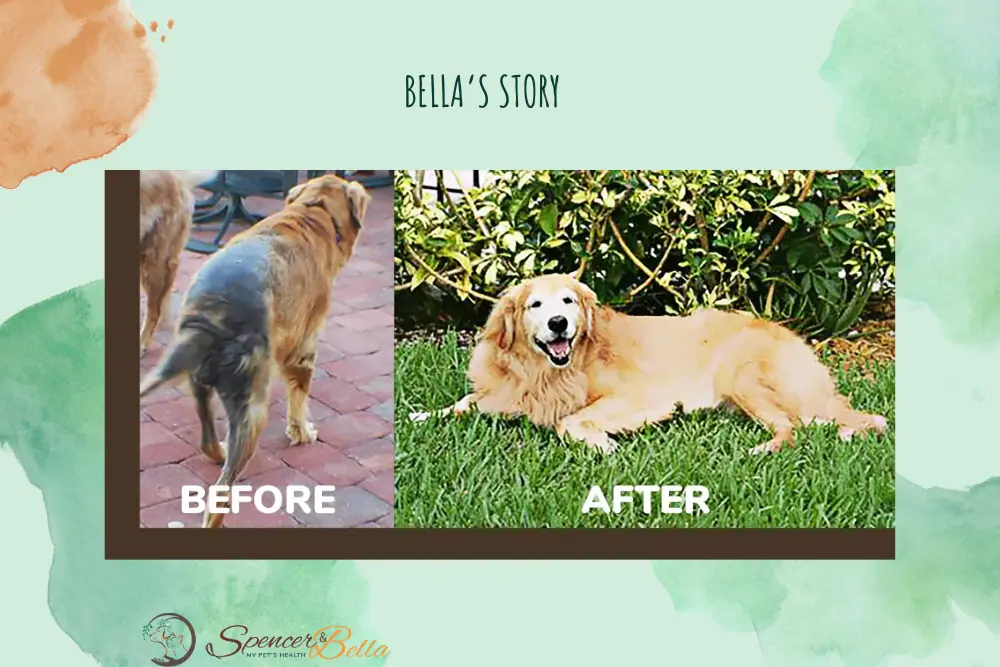
Harley, adopted at the age of 6 months, emerged from circumstances where proper care wasn’t feasible. He stands as the sole recipient of consistent cellular spray and green-lipped mussel oil capsules for the past 6 years. My cherished Brandy’s vibrant spirit endured until the age of 14, persistently darting around the yard like a youthful pup. Tragically, cancer manifested swiftly in her front leg, progressing to her lungs within a mere three months, leading to her passing. Cooper, on the other hand, faced his own health challenges. A mass on his shoulder emerged at 10, its progression contained until it spread to his rump, ultimately metastasizing at 12. It is my firm belief that the cellular spray facilitated crucial blood circulation around the cancer in both Brandy and Cooper, offering them comfort and support and prolonging their lives. The green-lipped mussel oil provided much needed nutrients to their overall wellbeing.
The chronicles of my journey alongside Spencer and Bella have been meticulously chronicled. Notably, the introduction of green-lipped mussel oil capsules brought about a remarkable transformation in Bella’s life, as can be witnessed in her inspiring story (https://www.spencerbella.com/about-us/bellas-story).
Since 2009, I’ve faithfully administered green-lipped mussel oil gelcaps to my canine companions. In 2017, a pivotal addition to their well-being routine took shape with the incorporation of cellular spray, a practice diligently upheld twice a day in conjunction with the green-lipped mussel oil gelcap regimen. Initially both supplements were under different brand names, now they are under my brand Spencer & Bella.
Conscientiously overseeing the dietary choices for my Golden Retrievers has remained an unwavering priority. Initially, I turned to various Golden Retriever communities for guidance, navigating shifting recommendations between grain-free and grain-inclusive diets. My journey of enlightenment encompassing the role of nutrition in Golden Retrievers’ cancer development has steered me toward a transition to a RAW diet.
Both Harley and my Akbash Great Pyrenees mix Sasha now partake in a RAW diet, a decision fortified by their consumption of RAW beef bones. Beyond the realm of mere sustenance, this choice serves the purpose of nurturing their dental health. While I endeavored to maintain a disciplined routine of teeth brushing, my success has been variable. Fortunately, the accumulation of tartar has been minimal, I believe that the cellular spray and green-lipped mussel gelcaps has played a key role in their dental health as well. Notably, the introduction of quality beef bones, approximately 6 inches in length, has delivered exceptional results in keeping their dental hygiene in check.
A suggestion I consistently offer to Golden Retriever guardians is to conduct a thorough body check monthly. While your Golden is in a reclined or upright position, gently run your hands over their entire physique, encompassing their limbs. Be attentive to any unusual lumps or bumps. Should you come across any, document their presence on a notepad, recording their position and dimensions. Keep a vigilant watch on their size, and in the event of any noticeable alteration, promptly seek a consultation with your veterinarian.
If you’re fortunate enough to walk alongside a Golden Retriever in this journey of life, remember that every step you take together weaves a story of companionship, care, and love. From the genetic tapestry that shapes them to the activities that keep them vibrant, from the nourishment that fuels their days to the vigilant healthcare that safeguards their well-being, your choices are the threads that create a masterpiece.
As stewards of their happiness and health, we hold the power to give them not just a life span, but a life rich in vitality and cherished moments. With the guidance of Cellular BOOST and Essential OMEGAS, you’ve discovered the path to ensuring their best possible life.
So, as your Golden Retriever’s paws leave imprints on your heart, know that each day offers an opportunity to enhance their journey. With gratitude for the privilege of sharing life’s adventures with them, you’ve embarked on a path that lights up their days and leaves an indelible mark on their golden hearts.
Read our blog about the benefits of Cellular BOOST daily for your cats and dogs.
-
Cellular BOOST
$35.00 - or Subscribe and Save 10% -
Cellular BOOST & Essential OMEGAS Bundle
$84.00 - or Subscribe and Save 10% -
Essential OMEGAS
$49.00 - or Subscribe and Save 10%
Frequently Asked Questions About Golden Retrievers
Q: How long do Golden Retrievers typically live?
A: Golden Retrievers have an average life span of 10 to 12 years, although individual variations can occur based on factors like genetics, diet, exercise, and overall care.
Q: Do Golden Retrievers shed a lot?
A: Yes, Golden Retrievers are known for their moderate to heavy shedding. They have a dense double coat that sheds year-round and experiences heavier shedding during seasonal changes. Regular grooming and brushing can help manage their shedding and keep their coat healthy.
Q: Are Golden Retrievers prone to any specific health issues?
A: Yes, Golden Retrievers can be susceptible to certain health concerns such as hip dysplasia. Moreover, elbow dysplasia, cancer, heart conditions, and allergies. Regular veterinary check-ups can help detect and manage these issues.
Here’s our guide about Cane Corso Health Concerns.
Q: What questions should I ask a breeder?
A: When considering getting a Golden Retriever from a breeder, asking the right questions is crucial.
- Can I see the puppy’s parents and their health clearances?
- Are the puppies raised in a home environment with socialization?
- What health testing have the parents undergone?
- Can you provide references from previous puppy buyers?
- What is your approach to puppy training and socialization?
- Do you offer any health guarantees for the puppy?
- What support do you provide after the puppy goes home?
- Are you a member of any breed clubs or organizations?
- How do you ensure responsible breeding practices?
- Can you explain the puppy’s pedigree and lineage?
Q: Is it a good idea to adopt a Golden Retriever from a rescue?
A: Adopting a Golden Retriever from a rescue can be a wonderful and rewarding experience. Many rescued Goldens make loving and loyal companions. However, it’s essential to research and consider the dog’s background, temperament, and any potential health or behavioral issues. Additionally, rescue organizations can provide valuable insights to help you make an informed decision. It aligns with your lifestyle and ability to provide the care and attention the dog needs.
Numerous credible Golden Retriever Rescues are spread across the United States. Utilize Google to locate a rescue organization conveniently situated in your vicinity.
Q: What’s the best diet for a Golden Retriever?
A: A balanced diet with high-quality dog food that meets their nutritional needs is essential. Some owners opt for a RAW diet, while others prefer commercial dog food. Consult your veterinarian for personalized dietary recommendations.
Q: How much exercise do Golden Retrievers need?
A: Golden Retrievers are active and energetic dogs that require around 1 to 2 hours of exercise daily. Furthermore, regular walks, playtime, and mental stimulation are vital for their physical and mental well-being.
Q: Do Golden Retrievers get along with other pets and children?
A: Golden Retrievers are known for their friendly and gentle nature, making them generally good companions for other pets and children. Proper socialization and training play a role in ensuring harmonious interactions.
Q: Are Golden Retrievers easy to train?
A: Yes, Golden Retrievers are highly intelligent and eager to please, making them relatively easy to train. Positive reinforcement methods and consistency yield excellent results.
Q: How often should I groom my Golden Retriever?
A: Golden Retrievers have a dense double coat that sheds seasonally. Regular brushing helps manage shedding, and they typically benefit from a bath every 2 to 3 months. Their ears, nails, and teeth also require routine care.
Q: Should I spay or neuter my Golden Retriever?
A: The decision to spay or neuter your Golden Retriever can be influenced by factors like health, behavior, and the potential for preventing certain health issues. Consult your veterinarian for guidance based on your dog’s individual needs.
Q: How do I keep my Golden Retriever mentally stimulated?
A: Engage your Golden Retriever in activities like puzzle toys, obedience training, interactive play, and introducing new experiences. Mental stimulation is crucial for their well-being.
Q: Can Golden Retrievers live in apartments or small spaces?
While Golden Retrievers are adaptable, they thrive best in homes with access to outdoor space. Moreover, regular exercise and mental stimulation are essential regardless of living situation.


